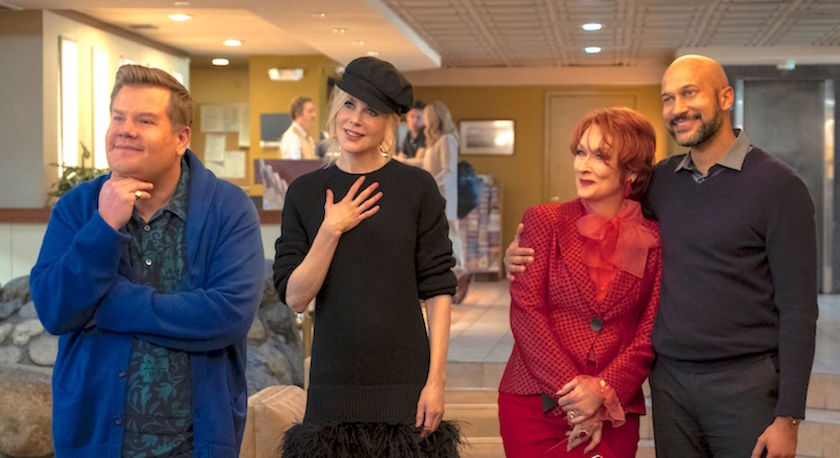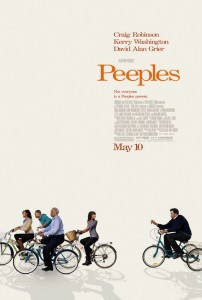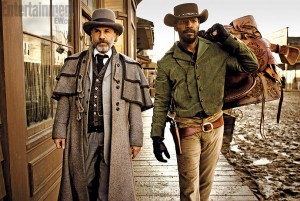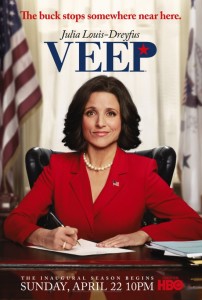The Prom
Posted on December 10, 2020 at 5:44 pm
B +| Lowest Recommended Age: | Middle School |
| MPAA Rating: | Rated PG-13 for thematic elements, suggestive/sexual references, and language |
| Profanity: | Mild language |
| Alcohol/ Drugs: | Some drinking |
| Violence/ Scariness: | Tense confrontations |
| Diversity Issues: | A theme of the movie, homophobia |
| Date Released to Theaters: | December 11, 2020 |
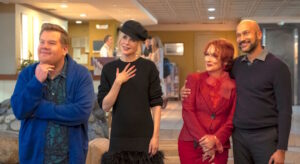
“The Prom” was a mildly successful Broadway musical about Broadway stars who want to restore their reputations after their new show has a disastrous opening night (a musical about Franklin and Eleonor Roosevelt). They see an injustice on Twitter. A small Indiana high school has cancelled its prom rather than allow a student to bring a same-sex date. And so, not even sure where Indiana is or what it is, they get on a bus, sure that their Broadway luster and can-do spirit will teach those people in flyover country about respect and inclusion. “This will be the biggest thing that’s happened in Indiana since..whatever the last big thing that happened in Indiana was,” one declares.
As you might guess, the Hoosiers are not impressed, even when Broadway leading lady Dee Dee Allen (Meryl Streep) pulls out her two Tony Awards, which she apparently has on hand at all times, in case someone does not who Who She Is. The high school student at the center of the fuss is Emma (a star-making turn from Jo Ellen Pellman) has a bigger problem than the prom; the girl who would be her date is the daughter of the woman fighting to prevent same-sex couples from attending (Kerry Washington as Mrs. Greene). Caught in the middle is the high school principal, Tom Hawkins, who happens to be a fan of Broadway musicals, especially those featuring Dee Dee (Keegan-Michael Key).
The story adds some unexpected sweetness and reconciliation but really the entire production is just a change to have some fun with some inside theater humor and put on a big, colorful, splashy show with a bunch of Tony and Oscar-winners. Streep has a blast as a larger-than-life personality who is only at home on stage. After letting down someone who genuinely cares for her, the only way she can apologize is to reprise one of her career’s signature numbers. Andrew Rannells (a Tony Award winner for “Book of Mormon”) has a huge musical number with local kids in a shopping mall. Nicole Kidman plays the kind of chorus line hoofer who goes from show to show but never makes it into a lead role, and James Corden is a gay man who sees Emma’s problems in very personal terms because his parents rejected him after he came out.
You don’t have to understand the relative status of a Tony vs. a Drama Desk award or remember which musical had the most performances before “Cats” to sit back and enjoy the good-hearted fun, clever lyrics (by Chad Beguelin), and the jubilant dance numbers choreographed by Casey Nicholaw. It most important message is not inclusion but about the power of art itself, especially big, splashy, energetic, colorful musical, to bring us together and heal what hurts.
Parents should know that the theme of this movie is homophobia and inclusion. It includes some sexual humor and some sexual references, some alcohol, and some strong language.
Family discussion: What would you say to Mrs. Greene? What’s your favorite musical?
If you like this, try: “Bye Bye Birdie,” “Footloose,” “Hairspray,” and “High School Musical”

